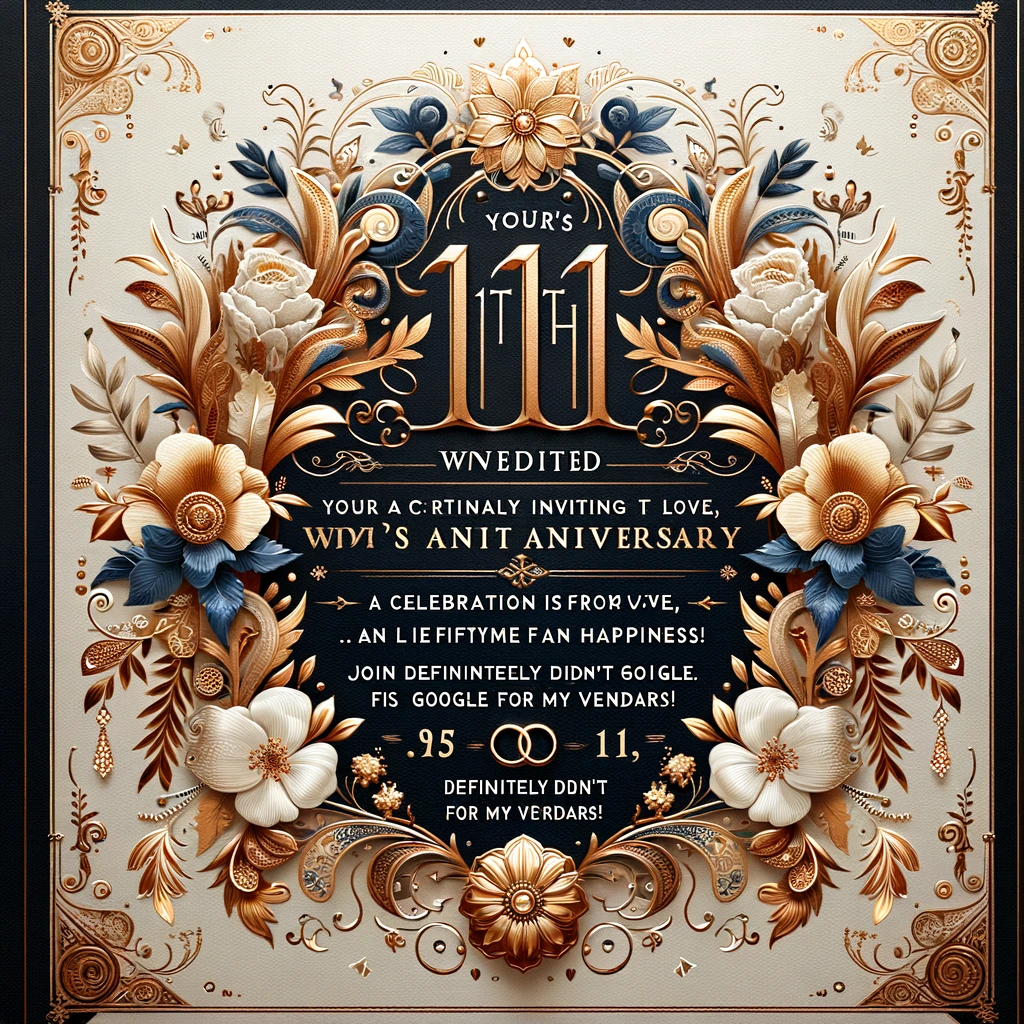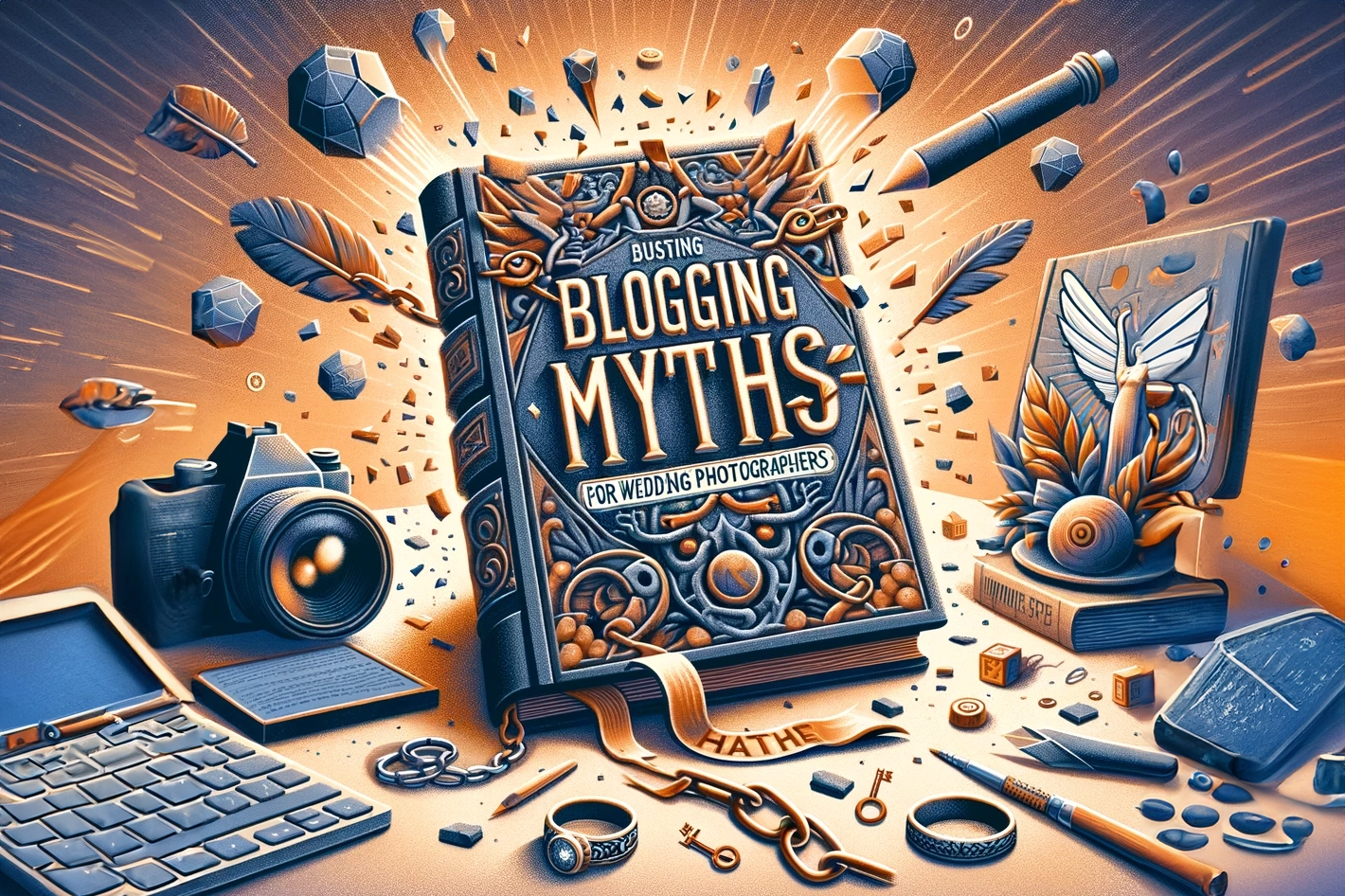6 Blogging Myths for Wedding Photographers
If you’ve been a wedding photographer or in the wedding industry for a few years, you’ve probably heard that “You gotta blog.” That’s spot-on advice, that is usually followed by complete nonsense in the form of blogging myths for seo.
Search engines go bananas for meaty, useful content, and cranking out a killer blog post is usually the way to serve it up.
But let’s be real, the internet is also chock-full of wonky SEO advice, especially in the wedding industry. You’ve got these business owners who caught wind of an SEO trick back in 1998 and are still swearing by it today. I’m not saying they are trying to hurt you, they mean well but end up spreading more myths than facts.
So, today’s mission is to bust some of those blogging myths in the wedding world and spare you from the frustration of wanting to drop-kick your iMac, delete your website, and become a silent monk. Let’s dive in, shall we?
Affiliate Links Disclaimer: This blog post may contain affiliate links, which means if you click on one of the product links and make a purchase, we may receive a small commission at no additional cost to you. This helps support our blog and allows us to continue to create content for you. We only recommend products and services we believe will add value to our readers. Thank you for your support!
MYTH: YOU HAVE TO BLOG OFTEN TO SEE RESULTS
Google, for the most part, doesn’t care how often you are blogging. That’s not to say it isn’t more beneficial to blog often, every blog post is the potential of your ideal client being introduced to your brand. Additionally, more blogs can build something called topical authority.
Topical authority is an SEO concept where a website aims to become the go-to authority on one or more topics. Building topical authority is about helping search engines understand a website’s topic so that it has better potential to rank for topically related keywords.
In simple terms, topical authority is when you talk so much about different aspects of subject that you are too hard to ignore. Think about that person in your life that doesn’t seem to have a life outside of a subject, like cycling for example. Whenever that person comes up your brain says “Hey thats the bike guy.” You want google to look at your site and say “Hey thats the wedding photography brand.”
Lastly, having something new released on the site does actually matter even if it is done sporadically. It;s not a cadence (pattern) thing, so much as a keep the site building thing.
You can actually write and release 52 blogs in a week and then not post all year, it wouldn’t be ideal but it wouldn’t hurt either. I like to say, post them as you have them. Thankfully, it’s not instagram where you would need to post every day to stay relevant.

MYTH: YOUR BLOG POST TITLES SHOULD INCLUDE YOUR BUSINESS’ MOST IMPORTANT KEYWORD
For example, your blog post title would say: “Alaska Wedding Photographer | Winter Engagement Session”
That should be something like Winter Engagement Session in Alaska or a post about what to expect for a winter engagement session, or even where to have a winter engagement session in your area.
No – Stop that. That is what I like to call hot caca advice. It’s going to harm your chances of ranking heres why:
This is called keyword stuffing, and its a really cool way to create keyword cannibalisation in your website. It’s kinda like punching yourself in the face, and then getting upset your face hurts.
Keyword Cannibalisation: an SEO problem that occurs when multiple pages on a site target the same keyword and serve the same purpose, and in doing so hurt each other’s search engine rankings.
In simple terms, you are confusing google because it isn’t sure what page is ACTUALLY about the term you are trying to talk about. When you confuse google, you lose google.
Additionally, it’s bad user experience. Your blog post titles should be describing what the post is actually about. They should in someway entice someone to click on them as well.
Here are some examples of good blog post titles:
- The Best Places to Elope in Las Vegas
- Small Wedding Venues in Orlando, FL (Intimate & Micro Weddings)
- 6 Incredible Orlando Proposal Ideas
MYTH: LUXURY OR HIGH-END CLIENTS DON’T USE GOOGLE

This one honestly makes me laugh a little, but it can be true depending on how you define luxury or high-end photography clients. The assumption is that people like this will only go off of referrals so we should ignore any other form of marketing, and while it’s true many of them would do that it does not account for the type of high-end clients that I prefer.
Here’s the thing, I do not give a shit about who “Giant Celebrity” is hiring at her 11th wedding.
While that would be most definitely a luxury client, it comes with strings that I find offputting. The clients that I want to help want to invest more in photography because of how important it is to them not because of how it makes them look. They don’t need photographs for Instagram to get some sort of brand endorsement, they don’t specifically want the images for social media presence, and they may choose better (for them) photography over a 500-person event with ridiculously outrageous movie-level decor. They want the photos because they are marrying their best friend.
I have actually booked 10-20K photography packages off of creating customized experiences that those clients would actually want.
So to me, high-end is someone willing to invest in photography because they actually care about the photos with their person. They are definitely on Google at all levels, and it’s unwise to ignore the possibility.
Someone’s income level does not stop them from getting excited and googling who to work with. They are still human.
To hit this further though:
“Google processes over 3.5 billion searches per day and 1.2 trillion searches per year worldwide. Google-owned and operated sites saw over 246 million unique U.S. visitors in February 2021. Google Maps has over 1 billion monthly users. “ – Zip.do
Just about every adult in the world has a cell phone with google or some kind of search engine attached in it. Assuming they dont get excited and search for things for their wedding is the strangest assumption one could make because it negates the humanity of the process.
Any ideal client regardless of budget is likely on Instagram, Google or another search engine, Youtube, Tiktok, and asking friends just like everyone else.
This doesn’t negate the importance of referrals in business because that’s one of the easiest ways to gain trust and authority for your sale to happen, but it’s insane to think that the only possibility of landing a client that will invest with you is via referral.
MYTH: YOU CANNOT RANK BLOGS WRITTEN BY AI.
I will accept some of the blame for this myth – when Chat GPT first came out that is what the rumor mill was and it made sense to me. Google’s main focus is search intent and user experience. So the idea that a robot would be preferring robots even over mediocre human written content was insane.
So… Here’s the thing, that is false and I’ve tested it thoroughly. You can absolutely rank with AI and I think its irresponsible for anyone in SEO not to be learning how to master it.
There’s a catch though – Ai should not be just writing the entirety of an blog outline and blog for you. You have to make the content unique which requires some sort of input from you.
Here’s what I mean:
If you are going to write a Top 10 venue post you shouldn’t just have the AI write a description of each venue for you, you need add in at least a little of your perspective. Additionally, you need to define where it gets its description from. Giving it a resource like the venue’s website or even wedding wire god forbid is better than just letting the AI find whatever it wants on Google will give you a much more apt description (probably more factual too.)
Ai is an incredible tool for helping even the poorest of writers create better content, but you shouldn’t be removing your opinion entirely, because it makes it easier to outwrite you. For now though, even having an entirely AI article on low competition topics is better than nothing.
There are 10 billion things AI could help you with in regards to SEO, here are a few of my favorite prompts:
Blog Ideas
Help me come up with a topical map for my blog that has the best chance of helping me rank for long tail keywords that are specific to my keyword “Wedding Photographer” and give each a clickbait-style title. Provide a list of 100 titles, and prioritize transactional intent topics. Next to each title, add the best longtail keyword phrase that the title should be targeting. Do not duplicate keyword phrases.
Create a table with this list with two sections: Title and Keyword
Venue Prompt
Write a concise, casual description of a wedding venue based on an image provided. The description should be straightforward, highlighting the venue’s key features, ambiance, and offerings without using overly descriptive or poetic language. Focus on the venue’s style, notable amenities, and the overall experience it provides for a wedding event. Include the venue’s name, address, and phone number in a simple list format without brackets or additional commentary.
Please add in that I like “X” about this venue.
MYTH: AI WILL MAKE SEO IRRELEVANT

Ai will absolutely impact SEO, but heres why it’s not going anywhere anytime soon.
The majority of google’s income comes from in search ads, roughly 58% of it’s current income. The primary method of charging for these ads is per click. Everytime Google adds AI into search and a click is taken away from an ad, it both costs Google more to deliver an AI search result and takes money from their own pocket by directing users to away from their own ad platform.
Ai is primarily fed by scouring the internet for data sources and interactions with dorks like me that spend all day prompting the AI. If all search results were provided by AI, it would take traffic away from websites which would then incentivise people to stop making content on their websites. If the websites no longer produce new content, the AI will eventually get stupid because it will have less and less relevant information to interact with the user with. If the AI doesn;’t have relevant information, the user will then stop using the AI.
So while you may see LESS clicks in search in the coming years, and some of that is going to be google experimenting with its algorithm and search, they need each other to resume profitability. Ai, Search, and User generated content (your website) all need each toher to survive as of right now so it’s a symbiotic relationship as opposed to a parasitic one.
I.E. Ai is going to change your results, but it isn’t going to kill SEO entirely. There is actually an argument that AI is going to make you more productive and that even though singular results might produce less clicks, you will be creating much more content then you ever would have in the past creating more opportunity than you ever would without Ai.
MYTH: YOU CAN RANK BLOGS WITHOUT WRITING, JUST USE IMAGES!
First – if all things in the universe align perfectly, then yes you could rank a blog with just images.
It would probably not be for a keyword that would be helpful, and there likely would be absolutely no traffic for it whatsoever.
A blog post isn’t good content if it’s just a tiny little paragraph and then 100 photos.
Google is not likely to rank posts that don’t include text that serves the search intent.
Search engines are all about words and how you use them, the images do give context though.
Search engines still use the written content, and even though they have a robust platform for understanding images… It’s just not all that helpful to the end user.
Think about it this way, if you wanted to know about a venue or location but all you were provided was an image would you have to search elsewhere to accomplish your goal? If so, you didn’t serve the user intent.
I you don’t provide much writing, Google is unlikely to understand what your blog post is about, and its not likely to rank or be considered high quality. If you consistently write garbage content, you will consistently get garbage results.
I would recommend at minimum having 500 words, but theres no hard line. You could technically rank a page with 100 words, but then someone could just as easily write a more informative post and quickly outrank you.
MYTH: INCLUDE AS MANY IMAGES AS POSSIBLE IN BLOGS
More photos mean a slower website, not more relevant content.
Google primarily ranks your content based on it’s text input not the number of images you have. I rarely ever post something with more than 25 images, and if it is that many the majority of the images hang out at the bottom of the article, because they are naughty and slow down the page load speed if they aren’t at the bottom.
That hurts the user experience because most people now have the attention span of me in a shiny object store. If your page loads slow, I’m going to leave the page.
Or to put it in the words of Cartman from South Park:
If that weren’t bad enough, the mobile users on your page are scrolling forever without a place to go next which will likely result in no inquiries for you anyway.
If you are going to include images in your blog:
- Make sure they are resized, not full-size high-resolution files— I resize images to 2040px on the longest side for images used in blog posts
- Optimize them with something like ShortPixel or my personal favorite EWWW Image Optimizer.
- Try and use your best 30 images if you need to use a lot, more than that gets a little iffy.
Try and remember images on a blog should be like the images in your portfolio. You don’t need to show everything, just the images that draw the most attention.


Great article as always roy! debunked many SEO myths I believed and offered practical advice that I can’t wait to implement on my own blog.